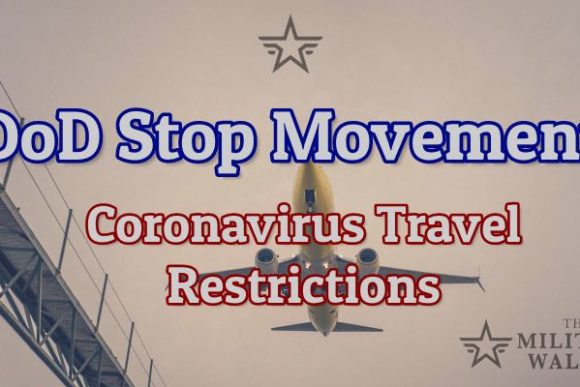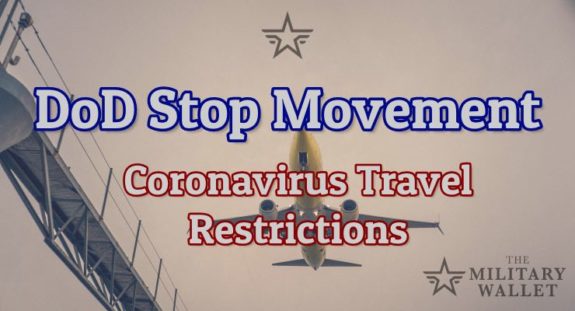Update – April 18, 2020: The MilitaryTimes reported that the DoD has extended the stop-movement order through June 30, 2020. The DoD is reviewing this decision every 15 days and is leaving open the possibility that they could either curtail the stop-movement order early or extend it, based on the situation at the time the decision is made. Some TDYs, PCS moves, or official travel may also be made during this window on a case by case basis.
Update – March 25, 2020: The Pentagon has extended to stop-movement order to include travel for exercises and deployments from combat operations in Afghanistan, Iraq, and Syria. This stop-movement order includes all military personnel and Defense Department civilians. Exemptions include those returning from temporary duty assignments, travel for medical reasons, and Navy ships en route (14-day quarantine period may apply).
The Department of Defense (DoD) announced a Stop Movement, or broad travel restrictions, in response to the Novel Coronavirus outbreak. The announcement, made on March 13, 2020, included a full “Stop Movement” for all domestic travel, starting March 16, 2020, and extending through May 11, 2020 (Extended through Jun 30, 2020).
The Stop Movement includes all official DoD travel including Permanent Change of Station moves, Temporary Duty Assignments, and similar non-essential travel. The Office of Management and Budget released a less-restrictive recommendation for decreased travel for Federal employees on March 14th (PDF).
Exceptions for the DoD Stop Movement order may be given for compelling cases where the travel is: (1) determined to be mission essential; (2) necessary for humanitarian reasons; or (3) warranted due to extreme hardship.
Members who have already started their travel or who are currently on a Temporary Duty assignment (TDY) may continue their travel or return home at the end of their TDY, provided the TDY is not in a CDC Level 3 location.
Servicemembers will only be allowed to take leave in the local area. Exceptions may be given for the same three reasons listed above – mission-essential travel, humanitarian reasons, or extreme hardship.
Who Does the DoD Stop Movement Apply to?
The DoD Stop Movement applies to,
“all DoD military and civilian personnel and their families assigned to DoD installations, facilities, and surrounding areas in the United States and its territories. All DoD military personnel will stop movement while this memorandum is in effect. In addition, DoD civilian personnel and DoD family members, whose transportation is government-funded, will also stop movement. This policy applies to Permanent Change of Station (PCS) and Temporary Duty. Additionally, until the domestic travel restrictions prescribed above are lifted, DoD Components may only onboard civilian employees within the local commuting area, and military members are only authorized local leave in accordance with Service policies.
ADVERTISEMENT
Exceptions to the DoD Stop Movement Policy
As always, there are some exceptions to the policy. Here are a few of them:
- Travel by patients and medical providers for the purpose of medical treatment for DoD personnel and their family members is authorized.
- Individuals who have already initiated travel (including intermediate stops) are authorized to continue to their final destination. Individuals whose TDY ends while this memorandum is in effect are authorized to return to their home station.
- Individuals pending retirement or separation during this period are exempt.
- Authorized travelers will adhere to the Force Health Protection guidelines in reference (b) and later guidance, if any.
- Travel exceptions may be granted in writing to the guidance contained herein for compelling cases where the travel is: (1) determined to be mission-essential; (2) necessary for humanitarian reasons; or (3) warranted due to extreme hardship.
Mission-essential travel refers to work that must be performed to ensure the continued operations of mission-essential functions, as determined by the DoD Component.
Waiver Authority
According to the DoD Memorandum,
Approval authority for these exceptions belongs to the Combatant Commander if the individual is assigned to a combatant command; the Chairman of the Joint Chiefs of Staff if the individual is assigned to the Joint Staff; the Secretary of the Military Department concerned for personnel under his or her jurisdiction; or the Chief Management Officer for the Office of the Secretary for Defense, Defense Field Activities and Agencies. This authority may be delegated in writing to a level no lower than the first general officer, flag officer, or member of the Senior Executive Service in the traveler’s chain of command or supervision. These exceptions are to be done on a case by case basis, shall be limited in number, and shall be coordinated between the gaining and losing organizations, as appropriate.
What About Guard and Reserve Members?
The Dod Memo doesn’t address members of the Reserve Component, with the exception of those who are currently TDY or on an assignment. They will be allowed to redeploy to their home station upon completion of their orders unless they are in a CDC Designated Level 3 Zone, in which case they will be required to remain in place until give then authorization to return home (unless granted a waiver).
Current countries with a Level 3 designation include China, Iran, South Korea, and most of Europe.
What About Traveling for Drill Duty or other Assignments?
The DoD Stop Movement Memo applies to “all DoD military and civilian personnel and their families assigned to DoD installations, facilities, and surrounding areas in the United States and its territories.”
That includes members of the Guard and Reserves. The memo doesn’t specifically address travel for Unit Training Assemblies, so you should work with your unit to determine whether or not you should report to drill. For now, you should work on the assumption that your drill is still on, unless told otherwise.
What about members of the Reserve Component who travel a long distance for drills?
Great question. It’s not uncommon for some members of the Guard and Reserves to travel several hundred miles from their place of residence to their unit for drill assemblies.
All I can say right now is to work with your unit. There should be additional clarification from the DoD and/or your unit between now and the end of the Stop Movement.
ADVERTISEMENT
Where Can I Get More Information About the Novel Coronavirus?
Stick with trusted resources. In this case, the Center for Disease Control, the DoD, the White House, and other government publications are your best bet for accurate and up to date information.
Stay away from non-official sources for information related to the Coronavirus and COVID-19. There is a lot of misinformation out there, much of which does more harm than good.
ADVERTISEMENT
Where Can I Get More Information on the Stop Movement?
Here is the DoD Memo (PDF).
Here is the DoD Travel Restriction FAQ Page (PDF).
Pay attention to announcements from your base, unit, or command. There will be additional announcements that come down the pipeline.
We are also publishing the DoD FAQ below:
DoD Travel Restriction FAQ:
The following Q&A is from the DoD PDF linked in the above section.
Q1. What is being done to ensure our service members are safe in their travels and keep them healthy?
A1. The actions outlined in Secretary Esper’s memo and the Force Health Protection Supplement #4 are done to protect our personnel and their families. The department will take several measures to enhance traveler safety, such as establishing pre- and post-travel screening and reception procedures and transitioning to military and DoD contracted aircraft for from or to CDC Level 3 or Level 2 designated areas. Additionally, DoD has instituted domestic official travel restrictions through June 30 (e.g. Permanent Change of Station and Temporary Duty) to safeguard our people. We encourage all DoD personnel and families to visit the DoD Coronavirus response page for tips on staying healthy.
Q2. Why did DoD institute travel restrictions on its people?
A2. In order to help limit COVID-19’s spread and its impact on the force, the Secretary of Defense instituted travel restrictions for both international and domestic travel.
Q3. Who does the domestic travel restriction apply to?
A3. All DoD service members and civilians, and their family members will stop all official travel – such as Permanent Change of Station or Temporary Duty – through June 30. Exceptions may be given for compelling cases where the travel is: (1) determined to be mission essential; (2) necessary for humanitarian reasons; or (3) warranted due to extreme hardship.
Q4. When does the domestic travel restriction go into effect?
A4. March 16.
Q5. If somebody is already TDY or a family has departed for their CONUS PCS, what should they do?
A5. Those who have already begun their travel may continue on to their final destination. Individuals whose TDY ends within stop movement period may return home. They should still be mindful of the health protection measures like social distancing and handwashing during their travels.
Q6. Does the domestic travel restriction affect those who must travel for medical treatment?
A6. No. Travel for medical treatment is still allowed.
Q7. Can military members still take leave?
A7. Service members may only take leave in the local area. This is being done to limit the spread of and potential exposure to COVID-19. Exceptions may be given for compelling cases where the travel is: (1) determined to be mission essential; (2) necessary for humanitarian reasons; or (3) warranted due to extreme hardship.
Q8. Do the Level 3 locations include the European countries mentioned by the president?
A8. DoD follows the levels and countries designated by the CDC. As of March 11, the CDC updated the list of countries designated as Level 3. This includes the Schengen Area countries of the European Union.
Q9. Does the Force Health Protection Guidance also go into effect March 13?
A9. Yes, the policy is in effect as of March 13. We ask that all of our personnel proactively taking the actions to protect themselves and those around them by employing those protective measures including practicing good hand washing, social distancing, and taking appropriate actions if feeling sick now. These measures can dramatically decrease the risk of infection and slow the spread of COVID-19.
Q10. What will screening measures (as mentioned in the Force Health Protection Supplement #4) entail?
A10. We are instituting risk assessments and if necessary, medical evaluations, for all personnel prior to departure on any military aircraft. Additionally, we are putting preventive monitoring measures in place for those who have recently traveled. Specifically, for those who recently traveled to, though, or from a CDC Travel Health Advisory Level 2 or Level 3 country, we are directing that they stay at home at 14 days, practice social distancing, and self-monitor for potential symptoms of COVID-19 including taking their temperature twice a day. For all other returning travelers, including those traveling within the United States, we are telling them to practice social distancing and be mindful in their daily self-observation for any signs or symptoms of COVID-19. For all, we are telling them that if they feel sick, they should immediately self-isolate, notify their leadership, and call the appropriate medical authorities for assistance.
Q11. Will DoD designate specific locations that service members returning CONUS must travel to in order to be placed under the 14-day restriction of movement?
A11. There is no designated quarantine location for returning personnel. Each service member will stay at home or other appropriate domicile coordinated with the parent command for 14 days, practice social distancing and conduct self-monitoring. All required pre-travel screening will be adhered to in accordance with the Force Health Protection guidance supplement #4: https://media.defense.gov/2020/Mar/11/2002263241/-1/- 1/1/FORCE-HEALTH-PROTECTION-GUIDANCE-SUPPLEMENT-4.PDF
Q12. What about individuals who have had their household goods picked up but haven’t departed their location?
A12. Each situation is different. Individuals will need to contact their shipping office to determine if their household goods are still in the local area and whether or not they may have access to them.
Q13. What about my POV? I have an upcoming appointment to drop my car off at the Vehicle Processing Center (VPC). What should I do?
A13: If you are unsure if the stop movement order applies to you, contact your chain of command. If the stop movement order does not apply to your PCS—or your chain of command has approved an exception to the order—proceed to the VPC as planned.
Q14: I’ve already dropped my POV off, but my PCS has been delayed. Can I get my car back?
A14: If you’re interested in retrieving your vehicle, contact the VPC immediately. VPCs are postured to assist customers with changing appointments, vehicle retrieval, and answering any other POV-related questions you have.
Q15. Now that CDC has declared a Global COVID-19 Outbreak Notice as Level 2, does that mean no families, domestically or internationally, can accompany on PCS moves?
A15. At this time, the United States is not designated as level 2. Domestic designations may change as conditions change in the coming days. All overseas locations are either Level 2 or Level 3. Yes, all family members of military and essential civilian employees will have their international travel deferred for 60 days.
Q16. With this new policy, what is the impact to those service members who have already received orders, to say, Korea or Japan? Will they be held in place?
A16. Depending on their location, effective March 13, all service members, civilians and families traveling to, from or through Level 3 locations (as designated by the Centers for Disease Control and Prevention) will stop movement for the next 60 days. As stated in the travel restriction guidance, exceptions may be granted for compelling cases where the travel is: (1) determined to be mission essential; (2) necessary for humanitarian reasons; or (3) warranted due to extreme hardship.
Q17. What do you mean when you talk about overseas “concurrent official travel” for families to Level 2 locations? Will families not be allowed to accompany?
A17. Concurrent travel refers to having family members travel with their sponsor. No, families will not be able to accompany their sponsor to overseas locations; their travel will be deferred for 60 days. As stated in the travel restriction guidance, exceptions may be granted for compelling cases where the travel is: (1) determined to be mission essential; (2) necessary for humanitarian reasons; or (3) warranted due to extreme hardship.
Q18. Will the screening measures only be for those landing in Level 2 or 3 locations?
A18. No, this policy applies to all personnel who travel or have recently traveled. However, the actions we expect our leaders and people to take are dependent upon their travel routes and locations. At this time, all countries other than the United States are either Level 2 or Level 3, which requires screening whether it was for travel to, from, or through.
Q19. Will a service member be allowed to PCS from Level 3 locations? Or will orders be canceled?
A19. All DoD uniformed personnel, civilian personnel and family members traveling to, from or through CDC Level 3 locations will stop movement for the next 60 days. As stated in the travel restriction guidance, exceptions may be granted for compelling cases where the travel is: (1) determined to be mission essential; (2) necessary for humanitarian reasons; or (3) warranted due to extreme hardship.
Q20. Is DoD planning to assist service members who have already terminated their leases in anticipation of a move within 30 days?
A20. DoD will use all means available to assist service members who were impacted by COVID-19. Please contact your chain of command for assistance.
Q21. Will the military cover their temporary housing until they can travel? Can they put the charges on their government travel card?
A21. DoD will use all means available to assist service members who were impacted by COVID-19. Approved reimbursable travel expenses are authorized to be placed on the government travel card. Please contact your chain of command for assistance.
Q22. Is there a freeze on civilian hiring in the affected locations?
A22. Yes, there is a freeze on hiring actions that involve PCS to Level 2 and Level 3 designated locations. For Level 3 locations, all hiring actions are subject to stop movement for the next 60 days. For Level 2 locations, hiring actions for essential civilian positions that require PCS may continue as planned. Similarly, DoD Components may continue local hiring. In the United States, only candidates within the local commuting area may onboard because of DoD’s restriction on official domestic travel that lasts through May 11 June 30. As stated in the travel restriction guidance, exceptions may be granted for compelling cases where the travel is: (1) determined to be mission essential; (2) necessary for humanitarian reasons; or (3) warranted due to extreme hardship.
Q23. Does this travel memo affect contractors traveling to and from those locations?
A23. We advise contractors to check with their companies.
Q24. What does government-funded leave actually mean?
A24. Government-funded leave is leave by a military member or DoD civilian employee whose leave involves Government-funded travel. One example is renewal agreement travel by civilian employees.
Q25. Can service members currently on leave in CONUS return overseas to a CDC Level 3 or Level 2 country they are stationed in?
A25. For Level 3: no, unless granted an exception. For Level 2, yes.
Q26. Can service members ETS and retire within the directive window?
A26. Yes and they are exempt from the travel restrictions.
Q27. Will reserve service members who are deployed to a CDC Level 3 or Level 2 location be permitted to redeploy CONUS upon completion of orders?
A27. For Level 3: no, unless granted an exception. For Level 2, yes.
Q28. How does this apply to Level 2 areas where service members are on military leave?
A28. For those who recently traveled to, through, or from a CDC Travel Health Advisory Level 2 or Level 3 country, we are directing that they stay at home at 14 days, practice social distancing, and self-monitor for potential symptoms of COVID-19 including taking their temperature twice a day.
Q29. How does this affect your relationship with host nations?
A29. We are working with partner nations in impacted regions to ensure the health and safety of our members as operations continue.
Q30. Who is the waiver authority for travel exceptions?
A30. Approval authority for these exceptions belongs to the combatant commander for those assigned to combatant commands. The Chairman may approve exceptions for the Joint Staff. The Secretary of the Military Department concerned and the Chief Management Officer, in the case of Defense Field Activities and Field Agencies, retain the authority for all other individuals. They may delegate the authority to no lower than the first general officer, flag officer, or member of the Senior Executive Service in the traveler’s chain of command or supervision.





About the comments on this site:
These responses are not provided or commissioned by the bank advertiser. Responses have not been reviewed, approved or otherwise endorsed by the bank advertiser. It is not the bank advertiser’s responsibility to ensure all posts and/or questions are answered.